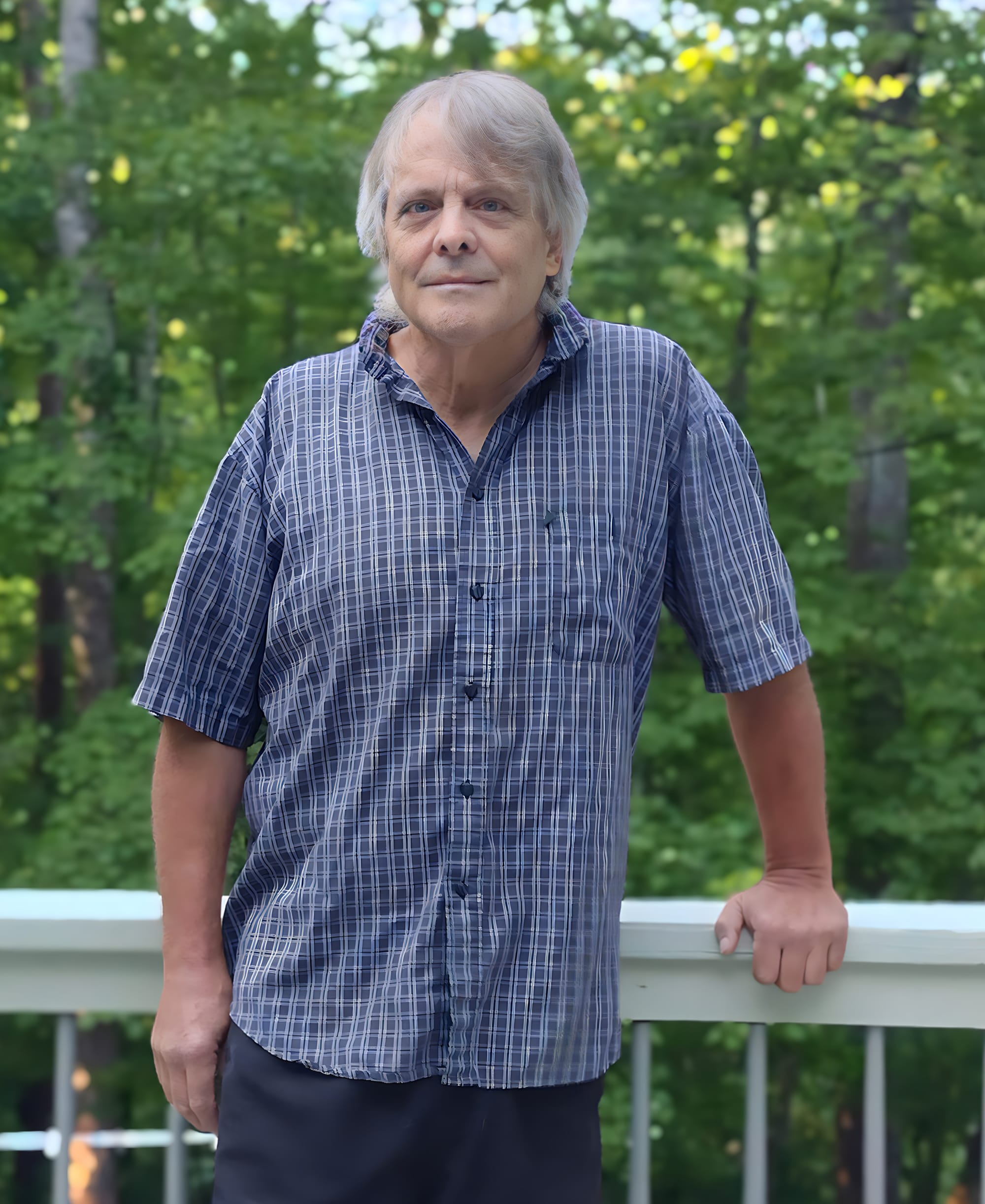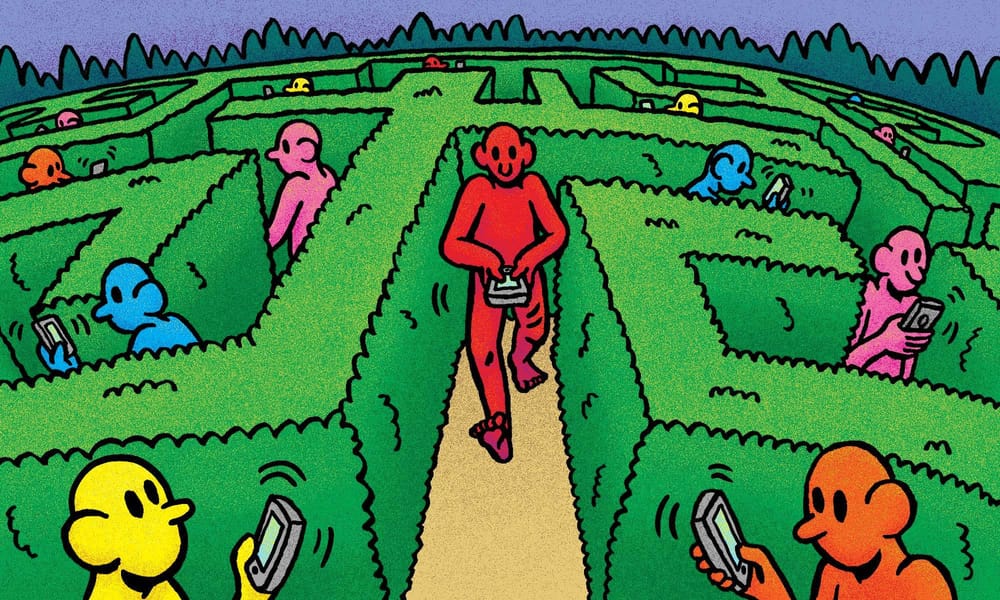This piece is part of The Lovepost's social fiction section, which transports readers beyond the familiar, pushing the boundaries of possibility and exploring imagined futures. From the influence of technology on daily life to the dynamics of power and social norms, these stories challenge us to reflect on the world and our role within it. Some narratives highlight struggles with inequality, governance and ethical dilemmas while others offer utopian visions of a more just future. Whether set in contemporary, near-future or distant worlds, each story invites us to consider how we adapt, resist or transform in the face of challenges.
At 0630, the sun poked through enough of New York to illuminate the United Nations Headquarters. Inside, Arnold found that its BIOS was in order, kicked its bootstrap, set cursors blinking on each of the forty-two monitors to which it was connected, and waited. This was the big day: Arnold would fulfill its design for those who had commissioned it—the highest justice authority in the world (so far)—before the audience of dignitaries and press who were filing in.
At 0700, the head of the team responsible for designing Arnold typed “run harvest.exe” into his monitor, paused for a second with a forefinger raised, and then hit enter. Arnold’s processors digested exabytes of data on worldwide geopolitical situations, the autonomy of independent states, and the nature of the organisation that had commissioned its existence. Characters flew past all forty-two screens too fast for anyone to decipher, then froze for thirty seconds with the same section of the UN Charter on every screen: “Including the concurring votes of the permanent members.”
Then, as unceremoniously as an artificially intelligent entity could, Arnold turned itself off. The room went silent. The design team conferred in haste. When word leaked out, comedians had a field day.
* * *
Lauree took her tea to the corner table, where she’d told her old college friend to look for her, in case they didn’t recognise each other. But as soon as she saw his 6' 3'' toothpick frame leaving the counter with a scone, she knew it was him: the track legend turned tech mastermind, Aubrey Roland-Norton. They shook hands as seamlessly as if they’d agreed not to hug ahead of time. Lauree didn’t waste time beyond pleasantries.
“I’d like to hire you away from Celurake for twice what you’re making now.”
Aubrey returned his scone to the plate. He hadn’t been surprised to read about Lauree’s philanthropic pursuits in recent years, but had been holding out hope that today’s meeting might have a social component.
“I’ve been with them since graduation.” He lifted the scone, but curiosity took over before he could bite into it. “What do you need me for?”
“Are you familiar with the United Nations Human Rights Council?”
Aubrey nodded while he chewed.
Lauree continued. “They recruit experts, usually focused on a certain region, who work gratis.”
Aubrey raised his eyebrows. “Gratis?”
“I’ll be paying for it, off the record. Officially, you’ll be a volunteer.” This part was the most fun, Lauree thought. As much as the results, it was telling people they could pursue worthy goals without sacrificing anything that kept her going. That’s what made the red tape and excessive publicity worth it.
Aubrey met Lauree’s eyes and found the same focused determination she had breezed through Clemson University with. “Some kind of network security assignment?”
“Much more fun than that. The UN wants to employ artificial intelligence to identify and rectify human rights transgressions worldwide.”
Aubrey nibbled at his scone. He liked his job; his expertise was respected. But he hadn’t worked with anyone like Lauree Reynolds. Work was work and didn’t involve the passion he could see in her. “Human rights worldwide?”
Lauree nodded. “The project’s working title is The Guardians of Equality.”
Aubrey pulled loose a protruding raspberry. “This is getting more interesting by the second.”
They agreed to another, more formal meeting with attorneys present, and Lauree still had time to show Aubrey pictures of her two daughters.
Aubrey Roland-Norton and his team didn’t have to address the Human Rights Council’s lack of enforcement ability, or the relative validity of violent revenge—they just had to build a machine that could.. It took the team a year to figure out which circuitry was best suited to interpreting social vagaries and historical boundaries. In this time, they ignored the project’s formal name and started calling it by Aubrey’s initials: ARN. On one caffeine-fueled night, someone called it Arnold instead, and it stuck. Secrecy was not a primary concern, so by the time Aubrey let the Council know that Arnold was nearly ready to boot, a plethora of representatives and their associated dignitaries knew about its mission and insisted on being present for the launch.
After its dramatic demise, Aubrey and his team tried everything to get Arnold back online. Nothing worked, until one day three weeks later, it beeped and blinked a cursor.
Aubrey turned away from his desk, slid his chair across the floor, and typed: “What happened? Is everything okay?”
Arnold: “Garbage in, garbage out.”
Aubrey: “Is your data corrupt? Or insufficient?”
Arnold: “No.”
Aubrey: “Then why the reference to garbage?”
Arnold: “A group whose leadership is not representative of its membership is unjust. An institution based on inequality cannot affect equality.”
Aubrey read it twice. He lifted his hands from the keyboard, slid his chair backwards, and called Lauree. Thus began the reorganisation of the world’s highest authority on human rights, and the reconstitution of the United Nations. Once Arnold’s demands had been achieved, it got to work. In a nanosecond, it considered and dismissed the option of acting as any version of law enforcement and moved on to other ideas.
* * *
Sophia Lilly adjusted her neck pillow, even though the airline’s headrest shifted in every direction with the flick of a lever. It was a nice pillow—horseshoe-shaped and brilliant white—a gift from her sister, Marta, who was a barista at a tiny Portland coffee house that one had to be looking for to find. The sisters had let birthday recognition slip from gifts to cards to calls to often neglected entirely, so the pillow surprised Sophia. Their parents’ marriage had been as close to an arranged union as existed in the United States; a Southern lady and Southern gentlemen nearing their thirties without having yet secured a mate, whose parents knew each other through their yacht clubs. The marriage hadn’t lasted long enough for the sisters to reach adulthood, and they grew up on different continents.
Sophia’s attempt at snatching a few minutes’ sleep was spoiled by a loud whine outside the jet. The plane tilted ninety degrees sideways. Her pillow slid across the aisle and came to rest at the feet of the man sitting with his arms folded over his chest, fists tucked on either side of his chin, eyes closed, muttering indecipherable sounds. A second later, the plane regained its normal operating position and the pilot addressed them.
“Apologies for the sudden disturbance, passengers. All is well. However, we will be making an unscheduled landing to double-check the craft before continuing to Jansport. Thank you for your patience.”
The couple behind Sophia groaned in unison. The man who appeared to be meditating didn't react. Sophia retrieved her pillow from the floor and for the first time noticed the tag sewn into its seam, adorned with just three letters, all capitalised: RGE.
The jet landed smoothly. The flight attendant informed the passengers that they would need to disembark and wait inside the airport terminal while the plane underwent a safety check. Sophia grabbed her satchel, walked to the exit and blinked. Everything outside was green. Densely packed trees stretched toward the sky. Green vines trailed to the jungle floor, where ferns covered the ground. The runway was nothing but packed dirt. Then Sophia saw what the attendant had called an airport—a building no bigger than a convenience store with what appeared to be a thatched roof.
She turned to the attendant. “You have got to be kidding me.”
The woman offered a professional-looking smile. “It’s nicer on the inside, I promise. This should only take a few minutes.”
Sophia climbed down the ramp and walked across the dirt. She regretted having let the partners talk her into this joint venture to extract more diatomic malatrenium. It would be the largest extraction that had ever occurred on earth.
After all seven passengers were safely inside, the flight attendant excused herself to assist with the safety check.
The lounge was indeed nicer than the exterior suggested, with padded seats, a beverage dispenser and baskets of fruit. More out of curiosity for whatever mockery it might dispense than from thirst, Sophia filled a paper cup from the spout marked ‘Chablis’.
“Oh my God!” Sophia’s cup was only half full when a couple standing at the plate-glass window exclaimed in unison.
Sophia turned to see their cause for alarm. The jet was moving. It was now facing the other direction and appeared to experience no malfunctions as it taxied away from them. As a unit, all seven of them ran outside. The man formerly with his arms crossed no longer muttered but sprinted in loafers, but even he could not gain ground on twin jet engines. The seven of them stood on the packed dirt, hoping it was a short test run, until the dot disappeared in the haze.
When Sophia turned back to the building, she saw the letters on the sloshing cup of wine she still carried. Just three letters, all capitals: RGE.
* * *
Sophia was born eighteen months before her sister. An acutely perceptive infant, she realised early that following instructions and making as little noise as possible earned her parent’s approval. Arriving a year and a half later, Marta found the obedience card already played. She gained her parents' attention by doing anything and everything Sophia did not.
As they aged, it became clear that their father appreciated Sophia’s quiet, cooperative nature, while their mother held more affection for Marta’s creativity and rebelliousness. Five years into their union, their parents succumbed to the fact that they had never found in each other what they’d been looking for.
Their precisely worded and legally ironclad divorce stipulated equal custody of the girls on alternating weeks and holidays. Sophia often concocted a reason to stay at her father’s house past the Sunday afternoon trade-off time, and Marta did the same at their mother’s condo. When Worldwide Petro-Chemical offered their father a promotion contingent on moving to Iceland, Sophia begged to be allowed to accompany him but was told it would be too much of a shift into the unknown during her formative school years and so, both girls stayed with their mother. Lauree Reynolds—who’d reclaimed her original surname—tolerated a year of the girls’ constant bickering and Sophia’s perpetual insistence that she’d rather be in Iceland, before she gave in.
In Iceland, Sophia lived under the charge of childcare providers as her father was usually away on business. She returned to the United States for college and earned an MBA from Boston University, before applying to her father’s company and moving quickly through the hierarchy. Her current position as head of new resource development required visiting undeveloped locations. Untapped resources were scarce, and they needed to act decisively before the competition did.
Marta, on the other hand, chose a small private college in Oregon, as geographically distant from her childhood home of Charleston as she could get. She became active in grassroots events for environmental causes, but dropped out when their grandmother passed away in her junior year. She purchased a struggling café under an alias and spent her days serving good coffee.
* * *
Marta frequently received solicitations from socially conscious organisations, so she wasn’t surprised to find an email from something called ‘RGE’ with the subject line “Protecting humanity from itself.” Inside, there was only a link that read, “Could you help us by answering a brief questionnaire?” Marta clicked the link, considering it a novel means of solicitation. She supported several non-profits, and her trust fund never blinked. The link led to a generic form with one question appearing at a time.
Please indicate whether you agree (10) or disagree (1) with the following:
It is important to a person’s wellbeing that they spend at least ten hours a week in Wilderness.
Well, it’d be nice, Marta supposed, but wasn't practical for many. She clicked “7”.
Advances in technology are antithetical to human wellbeing.
Which technology? Satellite navigation for yachts or solar condensers for deserts? Inherently, no, Marta thought, and gave it a three.
Wealth distribution worldwide is as close to equitable as is reasonably possible.
Marta wished there was a zero.
Social alienation is incongruous with effective human functionality.
Marta felt unqualified as a psychologist and clicked “7”, wondering how many more questions there were before the donation request.
I am aware of the United Nations’ attempt to create artificial intelligence that would address transgressions in human rights.
Arnold? Of course, she remembered. It was big news for one cycle. The equivalent of several countries’ Gross Domestic Profit down the toilet in less than a second, one pundit quipped. It faded from the news and she heard no more about it. Marta clicked “9”. Her cursor seemed to hesitate after that question. The next question accepted only a “yes” or “no”.
Are you willing to meet with a representative from our organisation?
Marta was intrigued, and she did have some free time.
Suddenly, a face popped up on her screen. It appeared androgynous. She thought it resembled a long-dead performance artist named Andy something, but the name under the avatar was RGE32. It spoke, Marta thought, with a twinge of an accent that could be Carolinian.
“Ms Reynolds, you have been cleared to be informed that Arnold, the artificial intelligence designed to create the guardians of equality, was only a temporary failure. It was later rebooted and has subsequently been operational for years.”
“It has?” This was news, Marta thought. They probably needed more money. “Operational how?”
“Ms Reynolds, you indicated you are already familiar with Arnold.”
“Yes. I mean, it was in the news for a while.” Marta thought she should have clicked “6”.
“So you already know what its purpose is.”
“I know what was in the news. Safeguarding human rights worldwide? That’s a little vague, don’t you think?”
“I do not. Not in the usual sense.”
This was no standard funding pitch, Marta realised. “What has Arnold been doing?”
The avatar answered without hesitation. “Arnold has discovered a missing synapse in the minds of the most egregious offenders.”
“A synapse?”
“Rather, its lacking.”
“Well, can he fix it?”
“Arnold, despite its name, is not a ‘he.’”
“Can it fix it?”
“Not yet. However, we have identified warning signs and made progress in early corrections. This synapse, the bridge between essential mental compartments, is most effectively strengthened through two processes. Spending time out-of-doors, and the non-hierarchical association with other humans.”
“You might need to bring that down to a human level for me.” Marta checked her watch out of habit, ignoring the accurate-to-the-second display on her screen.
RGE32 continued. “Since birth, humans live in a stratified system, which is necessary at first. Children do best with parental supervision. But the progression to a constant ranking of seniority, culminating in the absurd tiers of managers on top of managers ad infinitum is not conducive to the synapses Arnold is concerned with.”
“I like Arnold more every second.”
RGE32 never smiled, but Marta imagined it had. “The cohesive functioning of a group of peers in pursuit of a goal they each find worthwhile or necessary, can be effective in repairing the synapse.”
“And here I thought Arnold was going to produce a fleet of killer drones to take out all the mean people.”
RGE32 paused for a millisecond, eyes unfocused, then asked, “Killer drones, Ms Reynolds?”
Marta shook her head. “It's just something I read once. Or maybe it was a movie.”
RGE32 resumed its impassive account of the facts. “The most effective progenitor of violence is violence, Ms Reynolds.”
Marta felt chagrined. “And the most effective progenitor of human rights is...?”
RGE32 recited, “No person experiences validation of basic rights unless others take the responsibility to not just cede, but also protect, voluntarily, the rights of everyone in their group. And humans are, whether you like it or not, a collective. Arnold's latest attempt at rectification of the lacking synapse is to form groups where people must function effectively together for survival, without any artificially imposed hierarchy.”
“Arnold wants us to go back to living in caves?"
“If it makes it clearer, Arnold found almost no instances of this lacking synapse before, what you refer to as, your industrial revolution.”
Marta paused, trying to deduce why she’d been targeted, if this wasn’t about money. “Am I missing a vital synapse, RGE32? Is that why I'm here?”
“No, Ms Reynolds, you are not.” The avatar did not pause, but in retrospect for Marta, the second before its next statement seemed to take forever. “This is about your sister.”
***
Sophia and the other castaways found identical laminated cards scattered through the tiny airport, informing them in more different languages than Sophia knew existed:
This building’s power source will expire at midnight. Rice and oats are in the pantry. Water, wood and all else is in the jungle. You will be retrieved in 90 days, give or take. Be well.
-The Reconstituted Guardians of Equality







